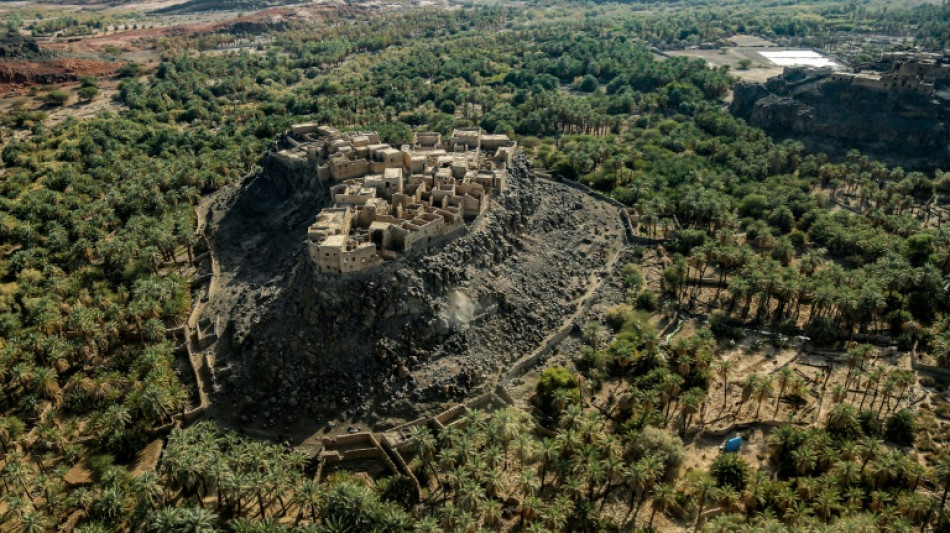
-
 UK growth slows in third quarter, dealing blow to Labour government
UK growth slows in third quarter, dealing blow to Labour government
-
Chris Wood hits quickfire double in NZ World Cup qualifying romp

-
 Markets struggle at end of tough week
Markets struggle at end of tough week
-
China tests building Moon base with lunar soil bricks

-
 Film's 'search for Palestine' takes centre stage at Cairo festival
Film's 'search for Palestine' takes centre stage at Cairo festival
-
Oil execs work COP29 as NGOs slam lobbyist presence

-
 Gore says climate progress 'won't slow much' because of Trump
Gore says climate progress 'won't slow much' because of Trump
-
'Megaquake' warning hits Japan's growth

-
 Stiff business: Berlin startup will freeze your corpse for monthly fee
Stiff business: Berlin startup will freeze your corpse for monthly fee
-
Wars, looming Trump reign set to dominate G20 summit

-
 Xi, Biden attend Asia-Pacific summit, prepare to meet
Xi, Biden attend Asia-Pacific summit, prepare to meet
-
Kyrgios to make competitive return at Brisbane next month after injuries

-
 Dominican Juan Luis Guerra triumphs at 25th annual Latin Grammys
Dominican Juan Luis Guerra triumphs at 25th annual Latin Grammys
-
Landslide win for Sri Lanka president's leftist coalition in snap polls

-
 Australian World Cup penalty hero Vine takes mental health break
Australian World Cup penalty hero Vine takes mental health break
-
As Philippines picks up from Usagi, a fresh storm bears down

-
 Tropical Storm Sara pounds Honduras with heavy rain
Tropical Storm Sara pounds Honduras with heavy rain
-
Pepi gives Pochettino win for USA in Jamaica

-
 'Hell to heaven' as China reignite World Cup hopes with late winner
'Hell to heaven' as China reignite World Cup hopes with late winner
-
Rebel attacks keep Indian-run Kashmir on the boil

-
 New Zealand challenge 'immense but fantastic' for France
New Zealand challenge 'immense but fantastic' for France
-
Under pressure England boss Borthwick in Springboks' spotlight

-
 All Blacks plan to nullify 'freakish' Dupont, says Lienert-Brown
All Blacks plan to nullify 'freakish' Dupont, says Lienert-Brown
-
TikTok makes AI driven ad tool available globally

-
 Japan growth slows as new PM readies stimulus
Japan growth slows as new PM readies stimulus
-
China retail sales pick up speed, beat forecasts in October

-
 Asian markets fluctuate at end of tough week
Asian markets fluctuate at end of tough week
-
Gay, trans people voicing -- and sometimes screaming -- Trump concerns

-
 Argentina fall in Paraguay, Brazil held in Venezuela
Argentina fall in Paraguay, Brazil held in Venezuela
-
N. Korean leader orders 'mass production' of attack drones

-
 Pakistan's policies hazy as it fights smog
Pakistan's policies hazy as it fights smog
-
Nature pays price for war in Israel's north

-
 New Zealand's prolific Williamson back for England Test series
New Zealand's prolific Williamson back for England Test series
-
Mexico City youth grapple with growing housing crisis

-
 After Trump's victory, US election falsehoods shift left
After Trump's victory, US election falsehoods shift left
-
Cracks deepen in Canada's pro-immigration 'consensus'

-
 Xi inaugurates South America's first Chinese-funded port in Peru
Xi inaugurates South America's first Chinese-funded port in Peru
-
Tyson slaps Paul in final face-off before Netflix bout

-
 England wrap-up T20 series win over West Indies
England wrap-up T20 series win over West Indies
-
Stewards intervene to stop Israel, France football fans clash at Paris match

-
 Special counsel hits pause on Trump documents case
Special counsel hits pause on Trump documents case
-
Japan's Princess Mikasa, great aunt to emperor, dies aged 101

-
 Cricket at 2028 Olympics could be held outside Los Angeles
Cricket at 2028 Olympics could be held outside Los Angeles
-
Trump names vaccine skeptic RFK Jr. to head health dept

-
 Ye claims 'Jews' controlling Kardashian clan: lawsuit
Ye claims 'Jews' controlling Kardashian clan: lawsuit
-
Japan into BJK Cup quarter-finals as Slovakia stun USA

-
 Sri Lanka president's party headed for landslide: early results
Sri Lanka president's party headed for landslide: early results
-
Olympics 'above politics' say LA 2028 organisers after Trump win

-
 Panic strikes Port-au-Prince as residents flee gang violence
Panic strikes Port-au-Prince as residents flee gang violence
-
Carsley hails England's strength in depth as understudies sink Greece

| RBGPF | 100% | 61.84 | $ | |
| CMSC | -0.24% | 24.55 | $ | |
| JRI | -0.23% | 13.21 | $ | |
| GSK | -2.09% | 34.39 | $ | |
| BCC | -1.57% | 140.35 | $ | |
| BCE | -1.38% | 26.84 | $ | |
| SCS | -0.75% | 13.27 | $ | |
| RIO | -0.31% | 60.43 | $ | |
| RELX | -0.37% | 45.95 | $ | |
| AZN | -0.38% | 65.04 | $ | |
| CMSD | -0.02% | 24.725 | $ | |
| NGG | 0.4% | 62.37 | $ | |
| RYCEF | -4.71% | 6.79 | $ | |
| BP | 1.65% | 29.05 | $ | |
| VOD | -0.81% | 8.68 | $ | |
| BTI | 0.2% | 35.49 | $ |

4,000-year-old town discovered hidden in Arabian oasis
The discovery of a 4,000-year-old fortified town hidden in an oasis in modern-day Saudi Arabia reveals how life at the time was slowly changing from a nomadic to an urban existence, archaeologists said on Wednesday.
The remains of the town, dubbed al-Natah, were long concealed by the walled oasis of Khaybar, a green and fertile speck surrounded by desert in the northwest of the Arabian Peninsula.
Then an ancient 14.5 kilometre-long wall was discovered at the site, according to research led by French archaeologist Guillaume Charloux published earlier this year.
For a new study published in the journal PLOS One, a French-Saudi team of researchers have provided "proof that these ramparts are organised around a habitat", Charloux told AFP.
The large town, which was home to up to 500 residents, was built around 2,400 BC during the early Bronze Age, the researchers said.
It was abandoned around a thousand years later. "No one knows why," Charloux said.
When al-Natah was built, cities were flourishing in the Levant region along the Mediterranean Sea from present-day Syria to Jordan.
Northwest Arabia at the time was thought to have been barren desert, crossed by pastoral nomads and dotted with burial sites.
That was until 15 years ago, when archaeologists discovered ramparts dating back to the Bronze Age in the oasis of Tayma, to Khaybar's north.
This "first essential discovery" led scientists to look closer at these oases, Charloux said.
- 'Slow urbanism' -
Black volcanic rocks called basalt concealed the walls of al-Natah so well that it "protected the site from illegal excavations", Charloux said.
But observing the site from above revealed potential paths and the foundations of houses, suggesting where the archaeologists needed to dig.
They discovered foundations "strong enough to easily support at least one- or two-storey" homes, Charloux said, emphasising that there was much more work to be done to understand the site.
But their preliminary findings paint a picture of a 2.6-hectare town with around 50 houses perched on a hill, equipped with a wall of its own.
Tombs inside a necropolis there contained metal weapons like axes and daggers as well as stones such as agate, indicating a relatively advanced society for so long ago.
Pieces of pottery "suggest a relatively egalitarian society", the study said. They are "very pretty but very simple ceramics", added Charloux.
The size of the ramparts -- which could reach around five metres (16 feet) high -- suggests that al-Natah was the seat of some kind of powerful local authority.
These discoveries reveal a process of "slow urbanism" during the transition between nomadic and more settled village life, the study said.
For example, fortified oases could have been in contact with each other in an area still largely populated by pastoral nomadic groups. Such exchanges could have even laid the foundations for the "incense route" which saw spices, frankincense and myrrh traded from southern Arabia to the Mediterranean.
Al-Natah was still small compared to cities in Mesopotamia or Egypt during the period.
But in these vast expanses of desert, it appears there was "another path towards urbanisation" than such city-states, one "more modest, much slower, and quite specific to the northwest of Arabia", Charloux said.
Ch.Campbell--AT


